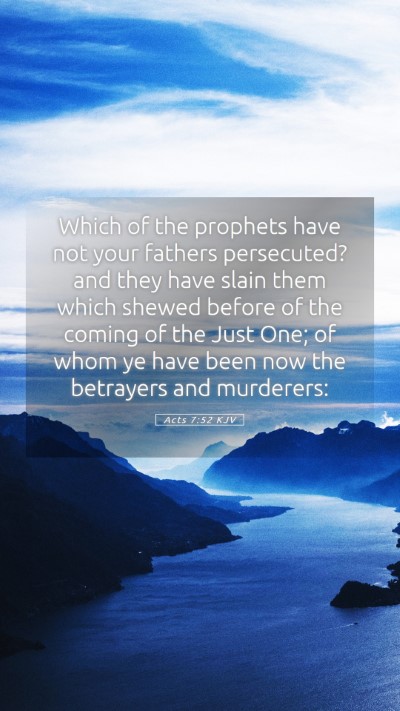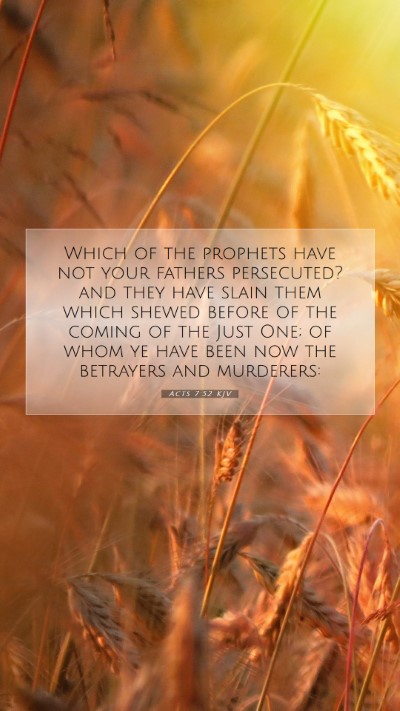Understanding Acts 7:52: A Comprehensive Bible Verse Commentary
Acts 7:52 states:
"Which of the prophets have not your fathers persecuted? And they have slain them which shewed before of the coming of the Just One; of whom ye have been now the betrayers and murderers."
This verse is a critical portion of Stephen's speech before the Sanhedrin, highlighting the historical opposition of the Jewish ancestors to the message and messengers of God. Below is a detailed analysis combining insights from various public domain commentaries.
Verse Overview
Stephen, in his speech, addresses the religious leaders, calling attention to their forefathers' consistent pattern of rejecting and persecuting God's prophets. This passage serves to underline the grave mistake of the current generation in condemning Jesus, the culmination of prophetic messages.
Commentary Insights
Matthew Henry's Commentary
Matthew Henry emphasizes that Stephen's point is not merely historical but also pointedly relevant to his audience's present actions. He notes that the Jewish leaders had a history of resisting God’s chosen servants, drawing attention to their inheritance of defiance. Henry highlights:
- Historic Rejection: The notion that their ancestors persecuted prophets draws a direct line of sin to the present.
- Prophetic Tradition: The “Just One” refers to Jesus, and the accusation of betrayal and murder solidifies the leaders' culpability in His death.
Albert Barnes' Commentary
Albert Barnes focuses more on the accusation and the rhetorical nature of Stephen's Question. He explains:
- Rhetorical Question: The phrasing implies that the answer is evident; historically, the prophets were rejected, and thus, the current leaders are in the same vein.
- Climactic Confrontation: By identifying the Jewish leaders as "betrayers and murderers," Stephen pushes them to acknowledge their severe moral failure.
Adam Clarke's Commentary
Adam Clarke provides an intricate look at the implications of Stephen's words. He interprets:
- Understanding of Prophecy: Clarke elucidates that the acknowledgment of the prophets’ suffering directly correlates with the present act of rejecting Christ.
- Call to Repentance: The critique is designed not merely for condemnation but offers a staunch call for introspection and repentance.
Historical Context
This verse needs to be understood against the backdrop of Jewish history, where prophets like Jeremiah and Isaiah faced persecution. Understanding the historical context aids in grasping the significance of the leaders' actions in light of God's persistent warning through His prophets.
Application and Relevance Today
Acts 7:52 continues to resonate with contemporary believers contemplating their response to God’s messages. It raises essential reflective questions:
- Are we open to receiving divine guidance, or do we also have a tendency to reject it?
- What situations in our lives echo the persecution of God's prophets?
- In what ways can we actively guard against the betrayal of God's calling in our lives?
Bible Study Insights
This verse serves as an excellent resource for Bible study groups or those engaged in online Bible study. It encourages discussions on:
- The consistent theme of rejection seen in scripture.
- Understanding the implications of biblical rejection in a modern context.
- Exploring how to apply biblical teachings in daily life situations.
Related Verses
Acts 7:52 connects thematically and contextually with the following verses:
- Hebrews 11:32-38 - Reflection on the suffering of prophets.
- Matthew 23:37 - Jesus lamenting over Jerusalem's history of killing prophets.
- Luke 11:49-51 - Jesus echoes Stephen's sentiments regarding the blood of the prophets.
Conclusion
Acts 7:52 serves as a profound reminder of the historical and spiritual implications of rejecting God's messengers. Through understanding scripture, this passage encourages self-examination and a commitment to welcoming God's guidance in our lives.


